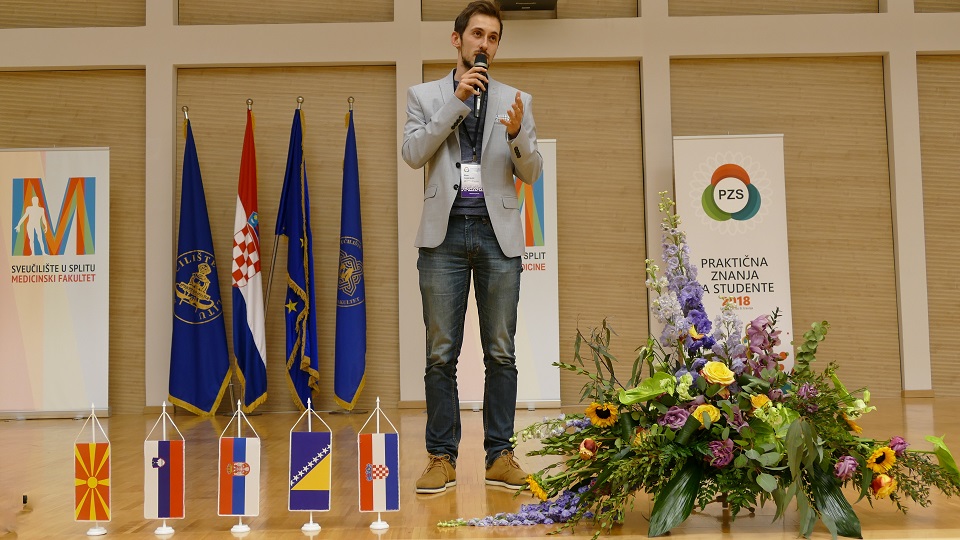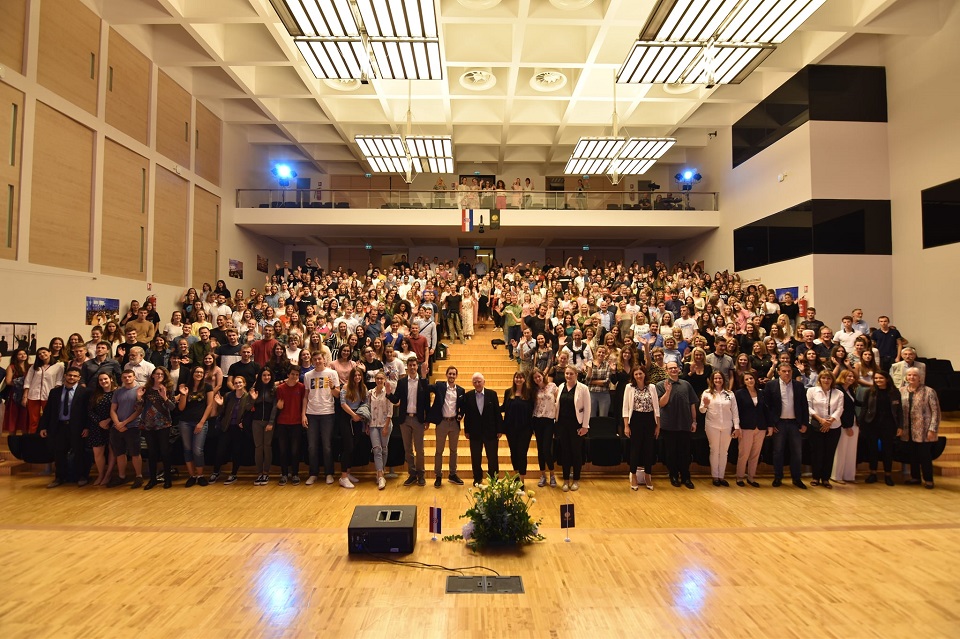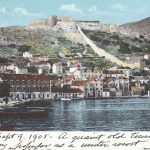Croatian Doctor Alen Juginović, a recent graduate of the Faculty of Medicine in Split, will be leaving Croatia in two weeks to start a Postdoctoral Researcher position at the most prestigious college in the United States.
Dr. Juginović graduated from the Faculty of Medicine in Split in 2018. In September 2019, he was in Houston, Texas completing the second of two US observership programs. Then, he had an idea. Since he was in the US, why not visit the top universities with Neuroscience programs? So, he reached out to the Neuroscience departments at Stanford, MIT, Harvard and Columbia to arrange campus visits.
Harvard Campus Visit Leads to Instant Job Offer
He spent a day and a half in San Francisco and walked among the majestic red-roofed Romanesque sandstone buildings of Stanford University in perpetually sunny Palo Alto. Then he jetted across the country to Boston. After touring MIT, he set off for a visit of the Neuroscience Department at Harvard. With a name tag pinned to his lapel, he met Dr. Dragana Rogulja, an Assistant Professor of Neurobiology. Instead of leading him on a tour of the department, Rogulja, originally from Belgrade, brought Juginović to her office where she began inquiring about his academic background, interests and experience. Two hours later, she offered him a job in her lab.
“Everything was moving in slow motion,” the young medical school graduate recounts. He had a bus to catch to New York City for his planned visit to Columbia University, so he briefly toured his future employer’s lab. They parted ways, and Rogulja promised Juginović that she would give him all the time he needed to think about her job offer. “You’re not dreaming,” she assured him. Upon departing the Ivy League institution, however, the young Croatian doctor was in such a state of shock, that he sat motionless and in a daze while he rode the Boston Metro. Then he realized that he had missed his bus to New York.
Alen Juginović waited over a month to accept the Harvard professor’s offer.
Three months later, Total Croatia News received a tip about Dr. Juginović’s job appointment at the most prestigious university in the United States, if not the world.
“I am reaching out to you with an exceptional success story about a young Croatian doctor who, as one of a very small number of Croatians in history, is leaving for the most prestigious university in the world – Harvard! I believe that this story, with all its successes, is very positive, incredibly unique and motivating for everyone in Croatia, especially the young. They will see how it is possible to reach the top of the world from tiny Croatia. I would ask you to consider this ultimate story of medical success for publication in your portal,” the source, overwhelmed with enthusiasm, wrote to us while insisting upon remaining anonymous.
Unique Story Follows Long-Lasting Croatian Tradition
Another story of a young talented Croatian leaving the county for better opportunities abroad; what makes this story so unique and motivating, I wondered. What’s the message for young people? Work hard for a future which only exists beyond your country? That scenario is so commonplace, so predictable – and has flourished without interruption since boatloads of young Croatian emigrants, housed in cramped steerage on majestic passenger steam ships, began making their way in masses across the Atlantic over 130 years ago. Croatian independence, secured in a hard-fought war 105 years later, was supposed to curb mass emigration, not accelerate it. It’s worth noting that Alen Juginović was born just a year before the last war officially ended.
The doctor and I agreed to meet at Vincek at 6pm on Friday. I’d passed the dessert café on Ilica many times but had never been inside. Frankly, I could do without the extra calories. I knew that the young doctor would arrive on time, a policy which seems to be hit or miss in this country, so I entered the very bright crowded café right at 6pm. As I meandered past glass cases of cakes and tarts, a lean spry figure passed me on the left from behind. I recognized him immediately, so I quietly followed him to the corner empty table, and waited for him to turn around, so as not to surprise him.
We shook hands and laughed about our simultaneous on-time arrival. He insisted on paying for dessert and coffee, I protested but quickly capitulated, still not entirely confident in Croatian customs. Juginović is a bright, wiry and very energetic figure. We chose sumptuous chocolate desserts, both of which were packed with calories. However, the young doctor, who was comfortably draped in an Adriatic-blue sport coat, white pressed shirt and muted chinos, showed absolutely no evidence of caloric abuse.
Juginović Outlines ‘Hygiene’ of Healthy Sleep Habits
I was pleased to learn that Dr. Juginović’s area of interest is studying and treating sleep disorders, because I’ve read a little about the subject, and could ask a few informed questions. Somewhere during the onset of middle-age, I had become a finicky sleeper. Sleeping a consecutive 8 hours is no longer a given, it has become a much-valued gift. So, we launched into a discussion about “sleep hygiene” as he called it. Admittedly, I was amused by the word hygiene, especially as it relates to Croatia. Try riding a crowded Zagreb tram in July and you’ll immediately know what I’m talking about.
So the young doctor enthusiastically reviewed the necessary components for “sleep hygiene”, some of which I already knew: keep the same sleep schedule, afternoon naps are OK as long as they are shorter than 45 minutes, avoid computers and smartphones (blue light), the sleeping room should not house elements of daily awake life (work-related tools) etc. He then went on to review the stages of sleep, the mechanics of each stage and circadian rhythms. I mentioned that I had read, to my relief, that the concept of a consecutive 7 to 8-hour sleep pattern only came into existence at the turn of the 20th century. Before that, many societies thrived on segmented sleep, with an interim wake period, which was integrated into daily life. He emphasized that sleep cycles are adaptable but that humans are not nocturnal by nature.
Dr. Juginović struck me as someone who lives fully scheduled days where every minute is accounted for, so I steered our discussion toward his autobiography. It unfolds like a resume every job recruiter dreams about (undoubtedly during REM sleep): President of Student Union, founder of NeuroSplit and member of the organizing committee for ISABS conferences.

Practical Knowledge for Students | Alen Juginović
Organizer of World Class Medical Conferences in Split
Most notably, he was instrumental in organizing two Split-based world conferences. The first, Practical Knowledge for Students, is an annual event which provides medical, dental and pharmacy students the opportunity to practice key physical functions in their chosen professions: like suturing. Suturing, I thought, don’t students practice how to suture in medical school? Apparently, not enough. As the young doctor pointed out, students only know how to perform many of these tasks in theory. I immediately wondered if this was true for US medical schools too. The conference has been a smashing success and participation has ballooned to over 400 students, who arrive in Split from all corners of the world.
The second conference, Nobel Days, brought together four Nobel Prize winners in one auditorium for panel discussions, which were free and open to the public. The panel comprised of Biochemist Richard Roberts, who received the Nobel Prize in Medicine in 1993; Biophysicist Joachim Frank, who received it in Chemistry in 2017; Physicist Georg Bednorz, who won the prestigious award in 1987; and Harald zur Hausen, a Virologist who received it for the discovery of the HPV virus and its association with cervical cancer. The 500-person capacity auditorium in Split was packed; with standing room only.
He also organized several fundraiser concerts with popular Croatian musicians to upgrade a home for children with special needs and finance improvements to pediatric and other medical facilities.
We briefly touched upon his observerships in Milwaukee and Houston, where he was impressed and surprised by the level of student involvement in extracurricular activities. Juginović considers participation in extracurricular activities essential for students’ well-being. It also brings balance to student life and takes the focus away from just attending classes and studying for exams. There are a lot of students who just spend their free time drinking coffee, he lamented, when they could be engaging with others in areas of personal interest and public concern. He also emphasized that he did not consider high grades to the most important criteria for success and even admitted that he didn’t have a perfect grade point average.
So, Juginović’s autobiography is full of significant and impactful achievements, which he shared with enthusiasm, energy and passion. It wasn’t at all difficult to imagine how he wowed that Serbian professor in Boston, who runs a lab at the most prestigious university in the world. And, their partnership suggests a promising overseas Serbo-Croatian collaboration, which is still a rarity in the homeland.

Nobel Days | Alen Juginović
The Croatian Journey to America Spans Over a Century
My grandfather arrived at Ellis Island on the SS Slavonia, which had departed Rijeka on a 19-day journey to America. The trans-Atlantic journey, which he had most likely spent in steerage, was long and grueling, but the young nation was open to everyone who arrived. One hundred fifteen years later, getting into America has become much more complex. One way is to successfully and illegally traverse an increasingly fortified Southern border. Another way is to obtain a H-1B visa, and eventually a Green Card, which can be a complicated affair, and is only expedited by possessing vast financial resources, outstanding individual talent or powerful connections.
In Dr. Juginović’s case, Dr. Rogulja and Harvard will likely process a H-1B visa application which allows a US employer to temporarily hire a foreign worker in a specialty occupation. For a world renown institution like Harvard, that process will likely be streamlined and accelerated, regardless of legal route. It’s worth noting that Croatia remains among just a handful of EU countries for which the US still requires a visa for entry, even as a tourist. However, US and Croatian efforts are now finally underway to abolish that requirement within the next few years.
So, in a little over two weeks the young Croatian doctor will board a plane bound for America. He’ll arrive in Boston in a matter of hours, not weeks, where he will immediately be taken under Harvard’s wing and will undoubtedly surpass their high-performance standards. His job offer comes with a three-year renewable contract, and from there the possibilities are boundless. In the meantime, he must pack for relocation to “The Hub of the Universe”. And HRT (Croatian Radio Television) has just contacted him for a news feature, which will be filmed at St. Catherine’s Hospital in Zagreb, where he remains employed until his departure.
No Long-Term Plans to Return to Croatia Permanently
For a young man who proceeds with such deliberate intention; like organizing significant world conferences with science visionaries and planning personal tours of America’s top universities, I wondered where Dr. Juginović saw himself in the future. Did he consider America a place to expand his knowledge, absorb her best practices, learn from her shortcomings, and return to his homeland to share that vision, knowledge and optimism? Or was America a more permanent destination?
“I don’t think that far ahead, and am open to all opportunities,” he responded, and emphasized that his focus was on the moment and never extended beyond the next day or two. One could not help but sense the empty space that someone, who had been such a daily inspiration to fellow students, would leave behind. Is he coming back to visit, I wondered. He replied that he’d be back during summer break. How does summer break work for a researcher at a university, I thought aloud. Does it follow the academic calendar? He’d probably come back for a week, he answered tentatively and emphasized that his primary passion is to motivate students. “Never underestimate the power of students,” he proclaimed with conviction.
Even if Alen Juginović’s return visits to Croatia are brief and rare, I’ll safely bet that a more refined version of his story, which he shared with me over coffee and dessert, will appear as a TED Talk on YouTube. It’s simply not even a matter of if; it’s a matter of when. And sure enough, it turns out that his future Serbian mentor has already given a TED Talk. Young Croatians seeking motivation will be able to locate inspirational footage of the soon-to-be former Split resident online by a Google search. Some will be enchanted by his fulfillment of the American Dream, a concept which has long ago achieved mythical proportions. Others, perhaps, might be inspired to stay and effect change in their homeland. Dr. Juginović emphasized that his parents and three close friends have been his main source of inspiration.
Saying Goodbye and Reaching Out for Something New
He admitted that the last few weeks have been emotional. Late one night he sat on a bench ten meters from the sea with a close friend and disclosed that he was leaving for America. Without saying a word, the friend simply hugged him. “Everglow” by Coldplay was playing on the car radio on their way home and that song will always commemorate the moment, he reveals. Then he showed me a stunning image of a sunset taken high up in the hills overlooking Split and the Adriatic Sea. The soft horizontal bars of deep blue and orange were broken up by the silhouette of a young man with mussed up hair and the roof of a car. Flickering lights of Croatia’s second largest city, a city that existed long before the arrival of Croatian tribes, dotted the lower right-hand corner of the image. These were among the reflections of a young man saying goodbye.
Near the end of our conversation, we spoke briefly about his favorite songs. In addition to “Everglow”, he mentioned “Purple Rain” by Prince. We immediately agreed that it was impossible to enjoy songs with meaningless lyrics. In that context, “Purple Rain” seemed like an improbable choice, not to mention that the song was a massive worldwide hit a decade before he was born.
Prince explained the meaning of his song to an interviewer as follows: “When there’s blood in the sky – red and blue = purple… purple rain pertains to the end of the world and being with the one you love and letting your faith/god guide you through the purple rain.”
At the beginning of the song, the late musician’s lyrics appear to be directed toward an individual and allude to the end of a friendship. Then he acknowledges that times are changing and “it’s time we all reach out for something new, that means you too.” Had the young Croatian doctor experienced the end of a friendship? We hadn’t gotten that personal, but I suspect that his affinity for this song hinted at a more collective, rather than personal experience. Near the end of the legendary anthem, Prince calls out to his audience:
You say you want a leader
But you can’t seem to make up your mind
If you know what I’m singing about up here
C’mon, raise your hand
Follow our Lifestyle page and Diaspora page for more information on Croatians and their successes abroad. For updates on Dr. Juginović’s pursuits and health advice, follow his Twitter page here.










